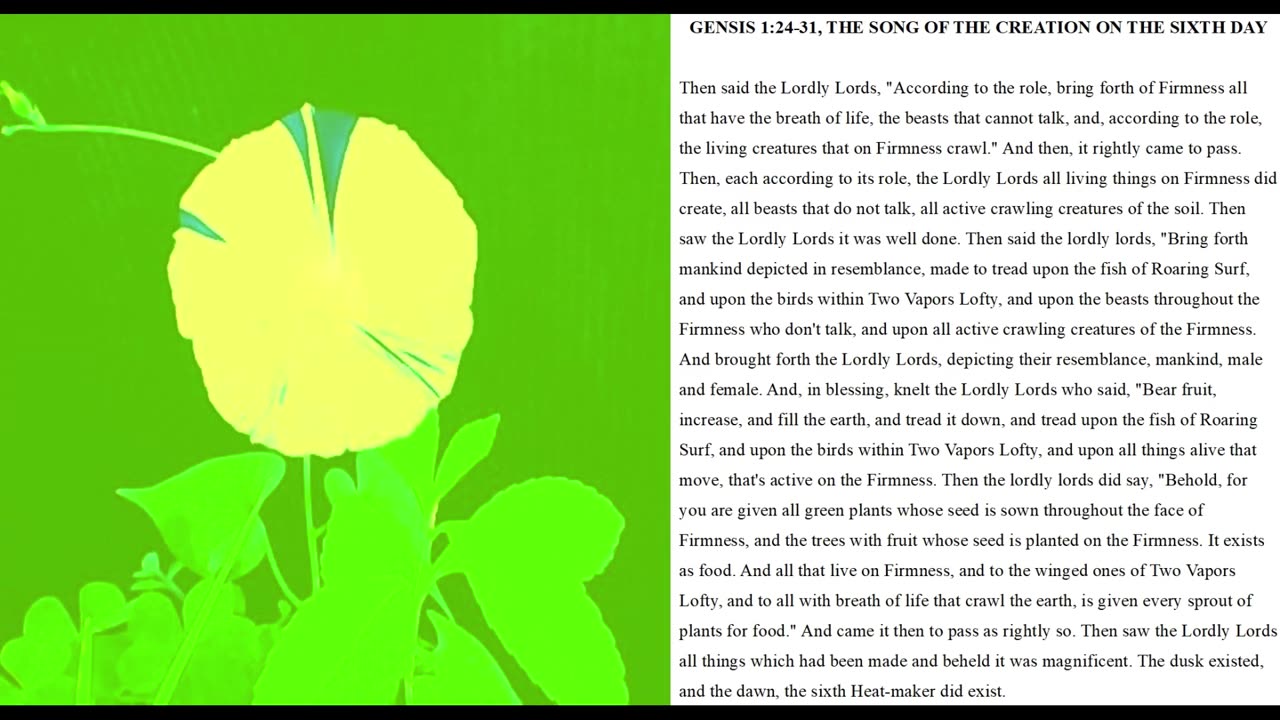Premium Only Content

GENESIS 1:24-31, THE SONG OF THE CREATION ON THE SIXTH DAY
This song sung acapella was finished by me on 19 June 2023. The song is an ethnographically inspired literal translation of the verses twenty four through thirty one of the first chapter of Genesis, the sixth paragraph according to the Masoretic text of the Hebrew Bible which, in Biblical Hebrew, is as follows:
וַיֹּאמֶר אֱלֹהִים תּוֹצֵא הָאָרֶץ נֶפֶשׁ חַיָּה לְמִינָהּ בְּהֵמָה וָרֶמֶשׂ וְחַיְתוֹ־אֶרֶץ לְמִינָהּ וַיְהִי־כֵן
וַיַּעַשׂ אֱלֹהִים אֶת־חַיַּת הָאָרֶץ לְמִינָהּ וְאֶת־הַבְּהֵמָה לְמִינָהּ וְאֵת כָּל־רֶמֶשׂ הָאֲדָמָה לְמִינֵהוּ וַיַּרְא אֱלֹהִים כִּי־טוֹב
וַיֹּאמֶר אֱלֹהִים נַעֲשֶׂה אָדָם בְּצַלְמֵנוּ כִּדְמוּתֵנוּ וְיִרְדּוּ בִדְגַת הַיָּם וּבְעוֹף הַשָּׁמַיִם וּבַבְּהֵמָה וּבְכָל־הָאָרֶץ וּבְכָל־הָרֶמֶשׂ הָרֹמֵשׂ עַל־הָאָרֶץ
וַיִּבְרָא אֱלֹהִים אֶת־הָאָדָם בְּצַלְמוֹ בְּצֶלֶם אֱלֹהִים בָּרָא אֹתוֹ זָכָר וּנְקֵבָה בָּרָא אֹתָם
וַיְבָרֶךְ אֹתָם אֱלֹהִים וַיֹּאמֶר לָהֶם אֱלֹהִים פְּרוּ וּרְבוּ וּמִלְאוּ אֶת־הָאָרֶץ וְכִבְשֻׁהָ וּרְדוּ בִּדְגַת הַיָּם וּבְעוֹף הַשָּׁמַיִם וּבְכָל־חַיָּה הָרֹמֶשֶׂת עַל־הָאָרֶץ
וַיֹּאמֶר אֱלֹהִים הִנֵּה נָתַתִּי לָכֶם אֶת־כָּל־עֵשֶׂב זֹרֵעַ זֶרַע אֲשֶׁר עַל־פְּנֵי כָל־הָאָרֶץ וְאֶת־כָּל־הָעֵץ אֲשֶׁר־בּוֹ פְרִי־עֵץ זֹרֵעַ זָרַע לָכֶם יִהְיֶה לְאָכְלָה
לְכָל־חַיַּת הָאָרֶץ וּלְכָל־עוֹף הַשָּׁמַיִם וּלְכֹל רוֹמֵשׂ עַל־הָאָרֶץ אֲשֶׁר־בּוֹ נֶפֶשׁ חַיָּה אֶת־כָּל־יֶרֶק עֵשֶׂב לְאָכְלָה וַיְהִי־כֵן
וַיַּרְא אֱלֹהִים אֶת־כָּל־אֲשֶׁר עָשָׂה וְהִנֵּה־טוֹב מְאֹד וַיְהִי־עֶרֶב וַיְהִי־בֹקֶר יוֹם הַשִּׁשִּׁי פ
http://www.qbible.com/hebrew-old-testament/genesis/1.html
As ethnography aims at understanding a people through their own eyes and ears at a particular point in their history, this translation strove to provide a translation that, to the extent this might be possible, would exactly convey the meaning the words of this text had for the first people who encountered it, either in writing or listening. The translation, thus, ignores over 2000 years of Biblical interpretation, both Jewish and Christian and makes a best effort to let the words speak for themselves. The translation is sung because the translation, due to the repetitive nature of its phraseology, lends itself more to song than to normal recitation. However, as the language of the translation is English, it is sung according to the traditions imposed on song by English rhythmic structures. Accordingly, it could not be rendered in English in the manner of Hebrew and so, in this regard, no effort was made to do so. Nevertheless, I cannot help but think that the joyous nature of the content was, to a certain extent, respected in the choice of the melody used when sung. Rumble is the only video sharing platform to which there are any plans for an upload.
-
 2:16
2:16
Hickory Presents Poems, Poetry, Songs, Music, Art & Artists
1 year ago $0.01 earnedPersimmons: A Father's Day Song
20.1K1 -
 UPCOMING
UPCOMING
Steven Crowder
1 hour ago🔴 Epstein File Watch & DOGE’s $17M Muppet Show Explained
8.21K9 -
 LIVE
LIVE
Timcast
15 minutes agoTrump Orders ALL TRANS MILITARY Discharged, Trans Person CAUGHT With BOMBS At Tesla Dealership
3,797 watching -
![🔴[LIVE TRADING] BREAKING MARKET NEWS: Bounce or Bust?! || The MK Show](https://1a-1791.com/video/fwe2/37/s8/1/a/0/k/n/a0kny.0kob.2-small-LIVE-TRADING-BREAKING-MARKE.jpg) LIVE
LIVE
Matt Kohrs
9 hours ago🔴[LIVE TRADING] BREAKING MARKET NEWS: Bounce or Bust?! || The MK Show
2,427 watching -
 47:26
47:26
BonginoReport
2 hours agoEpstein Files Drop Today-But How Much Will They Reveal? (Ep.149) - 02/27/2025
25.5K42 -
 LIVE
LIVE
Wendy Bell Radio
5 hours agoThe Left Is Wrong About Everything
12,741 watching -
 29:05
29:05
CatfishedOnline
18 hours agoThe Real Jennifer Aniston or Another Romance Scam?
5.94K5 -
 34:44
34:44
LFA TV
5 days agoMIRACLES DO HAPPEN!
10.3K2 -
 16:43
16:43
T-SPLY
3 hours agoCNN Panel Member Forgets Donald Trump Runs The Military
7.34K11 -
 31:13
31:13
World Nomac
22 hours agoAMERICAN visits IRAN for 10 days (this is what I found) 🇮🇷
7.25K1